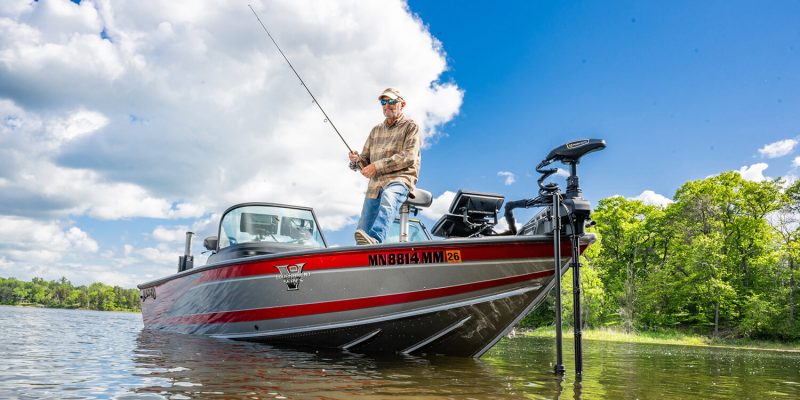For Al Lindner, there’s no better place to be than in a boat on a lake, fishing rod in hand, chasing his next catch. “I love the outdoors. I love walking, exploring new areas”, says Lindner. “But I’m at home on the water in a boat. That’s my favorite spot to be.”
Lindner, 79, has felt that way since childhood, when he caught the fishing bug angling for smallmouth bass from a boulder on Grindstone Lake in Hayward, Wisconsin, where his grandparents had a cabin. The Blue Cross member, who today lives in Brainerd, parlayed his passion into an impressive career spanning more than half a century.
It started in tackle development with his brother and grew to television, radio, magazines and a long list of other efforts aimed at expanding fishing education, accessibility and enjoyment. A household name in Minnesota and the sport of freshwater fishing, Lindner has been inducted into five different fishing halls of fame.
Still at it today, Lindner spends about 180 days a year on the water, much of that time producing projects like the show Angling Edge for his business, Lindner’s Media Production Company. His days are action-packed, but he wouldn’t have it any other way. Still fit as ever and free of any major health problems, he attributes his good health to an active, purposeful life well-lived.
Still at it today, Lindner spends about 180 days a year on the water, much of that time producing projects like the show Angling Edge for his business, Lindner’s Media Production Company. His days are action-packed, but he wouldn’t have it any other way. Still fit as ever and free of any major health problems, he attributes his good health to an active, purposeful life well-lived.
LINDY’S LIST
FAVORITE FISH: Smallmouth bass
FAVORITE MINNESOTA LAKES: Leech, Vermilion
FAVORITE TIME OF YEAR TO FISH: Fall — the fish bite all day!
NUMBER OF MINNESOTA LAKES FISHED: Too many to count
FAVORITE FISH TO EAT: Walleye, fried
MOST MEMORABLE FISH CAUGHT: “It was November and a few friends and I were below the dam in Brainerd, fishing for Walleye. One of the guys hooked a monster musky and it took an hour and a half to land. It was a world-record fish for many years!”


Fitness through fishing
“Fishing is physical,” Lindner says. “You know, you’re moving, you’re up and down in a boat, moving around, jumping around a lot. And when you’re filming, you’re active, really active. You get the adrenaline going a little bit. I love it.”
For eight months out of the year — April through November — Lindner is at his busiest, filming, writing, participating in tournaments and doing a whole lot of fishing. The sport provides a routine workout that he believes has helped keep him in shape. He also stretches and walks routinely and pays attention to what he eats, doing his best to maintain a balanced diet.
Other than a knee replacement and some shoulder soreness he’s experienced more recently, Lindner hasn’t developed any significant health concerns. His doctor has encouraged him to continue his lifestyle as long as he feels healthy enough to do it.
“They say to keep doing what I’m doing,” Lindner says. “That I’m in awful good shape for my age, so don’t slow down, don’t change. And I don’t plan to.”
It’s no exaggerated fish story — fishing can provide a wide range of health benefits. It is a low impact, total body workout that can help you stay physically fit. A few areas the sport can make an improvement:
Strength and balance
Don’t be surprised if you feel a little sore after a day on the water or dock. Actions like casting, reeling, standing and even setting up equipment work different muscle groups, including your arms, shoulders, back, core and legs. All of that muscle strengthening can also help with balance and preventing falls — especially if you’re working to stay stable in a boat.
“I love fishing in different kinds of lakes, the lakes I’ve never been on. That’s the most exciting thing to me.”
— Al Lindner
Heart health
Fishing is more often thought of as a and reduce skin cancer risk. Eating fish can also relaxing activity, but anyone who has hooked a fish knows it can get your heart going. Research has found that active fishing can burn an average of 200 calories per hour. That elevated heart rate helps you prevent high cholesterol and cardiovascular disease.
Vitamins and protein
Spending time on the water is a good way to take in Vitamin D from the sun, which helps your body absorb calcium — essential for strong bones and preventing osteoporosis. It also helps give your immune system a boost. Just remember to apply sunscreen SPF 30 or higher on any exposed skin to prevent sunburn and reduce skin cancer risk.
Eating fish can also be beneficial. They are rich in protein, vitamins and minerals, and fatty fish contain Omega-3 fatty acids that can improve heart health.
Did you know?

Minnesota is home to 160 species of fish, 141 of which are native to the state.
Mind games
You might think that after decades on the water, fishing comes easy to Lindner, but he says the sport is more complicated than that. The marine environment is always changing, whether because of climate, invasive species, man-made influences and more. As environments change, fish adapt. How they move, how they feed — their patterns are always evolving.
Attempting to solve that increasingly complex puzzle is what fascinates Lindner the most.
“It’s trying to figure out how to catch the fish,” he says. “I love fishing in different kinds of lakes, the lakes I’ve never been on. That’s the most exciting thing to me. Going to different water, trying to pattern the fish, figure out how to catch the fish. Once I get through with that and know that I can catch a whole bunch of fish, I’ll get bored really quickly and want to go to another lake or try another lure or something.”
Lindner says all the critical thinking helps keep him sharp. There’s a lot of medical research to back him up. Challenging your brain through hobbies, games and new activities helps to keep it healthy, according to the Mayo Clinic. So does socialization, which can help specifically with preventing memory loss, stress and depression.

Sharing the experience of fishing with others — grandkids, friends or family — is a great way to benefit your mental health. Lindner has always been a social fisherman who prides himself on sharing the sport and helping others enjoy it as much as he does.
“It’s so much fun. You can participate at any level you want,” he says. “And the thing is, no matter what physical condition you’re in, you can fish. In fact, it’s like medicine for a lot of people. Just to be outdoors, outside, being in environments like that, it’s healing. It’s really a powerful thing.”
H2425_072824_G01_C
Y0138_071624_P01_C


